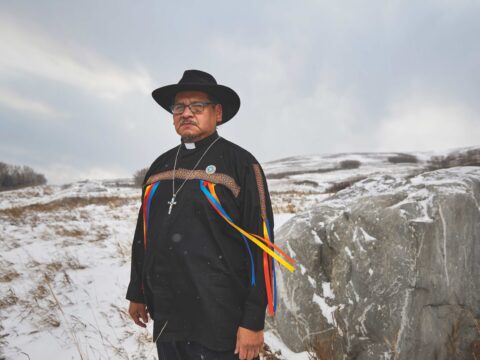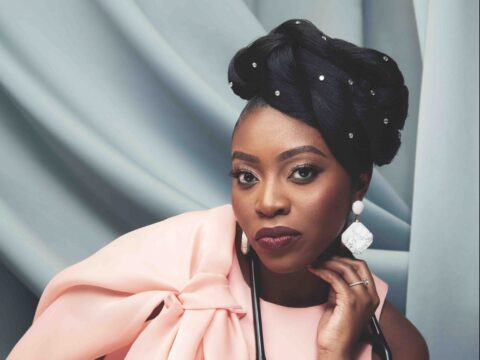“My daughter, Beth, was a dancer when she was younger,” says Rev. Roz Vincent-Haven, a retired United Church minister in Waterloo, Ont. “She was literally filled to the brim with the Holy Spirit when given the opportunity to express her faith with liturgical dance.” Beth Vincent, who lives with Down syndrome, relishes spontaneous unscripted dance, moving in response to the Spirit rather than to assigned choreography. But opportunities for liturgical dance were rare during the worship services of Beth’s childhood.
On one occasion, a church leader informed her she couldn’t dance during a service since she hadn’t attended all the rehearsals. Thankfully, fellow dancers refused to dance if Beth’s performance wasn’t part of worship — and dance she did. “Her interpretation was the centre point of the liturgical piece,” says Vincent-Haven. For her, Beth’s liturgical dance was an act of creative interpretation, a meaningful way of encountering the divine through the body.
Opportunities for embodied experiences and expressions of faith are rare in the ideas-focused worship services of the United Church. Sure, we sing, move our bodies and celebrate communion. Occasionally, we’ll clap our hands or join the children by shaking noisemakers or acting out a Bible story. But generally adult worship is an intellectual affair. Adult worshippers almost never dance, paint, write poetry, draw or venture outdoors.
But some theologians say there is no meaning-making without the body. Faith begins with the body, lives in the body, and is enhanced by sensory experiences. An emphasis on an intellectual faith is ironic for a community that is sustained by the Word made flesh, a human saviour who joined us in our real, messy and complicated lives. Our emphasis on intellectual worship at the expense of the body not only risks excluding people with intellectual disabilities but separates all of us from meaningful encounters with the holy.
The early Christian church valued the body as central to faith, with practices such as baptism, fasting, communion and pilgrimages. Surely, our early Christian communities would find our emphasis on intellectual faith puzzling, even nonsensical. “Not only did the early Christian church emphasize the body, but all religions centre faith within the body,” says Rev. Matthew Anderson, a biblical historian in Halifax and the director of the Nova Scotia Camino.
Thinking without the body yields ideas that aren’t grounded in the here and now, he adds. We become disconnected from our relationships with other creatures, the land and the Spirit. “By expanding worship to include sensory activities such as walking, dancing, singing, drumming, gardening, eating, fasting or painting, we encounter ourselves, our community and the divine in ways that are inaccessible to the mind alone,” Anderson says. “Over time, our minds quiet and a spiritual wisdom that eludes capture with words or ideas emerges.”
“Our heads do get in the way of faith,” says Rev. Bonnie Parsons, director of L’Arche’s the Spirit Movers, an inclusive liturgical dance troupe for people with intellectual disabilities. “When we move, we learn to trust the wisdom residing in our bodies.” In other words, through motion we move beyond God as an abstraction and experience a felt faith.
An integrated, embodied faith is also an inclusive faith, creating opportunities for participation and leadership for people with diverse gifts and abilities. In September, I attended a worship service led by Parsons and the Spirit Movers. The dance troupe invited the congregation to stand and join in a series of dances, teaching us steps as necessary. Initially I felt awkward, mixing my left and right and constantly bumping into the person next to me. I would have preferred to remain in the pew, passive and anonymous. But after a couple of songs, and once my head was no longer in the way, I discovered that dancing was joyful. And more importantly, dancing with the community demanded I engage. I couldn’t sit back and let the preacher do the work of worship. God was no longer an elusive idea, but a wholly inclusive spiritual experience.
It seems that very few United churches engage in sensory-based participatory worship, where all bodies move and sing and create art.
Yet it seems to me that very few United churches engage in sensory-based participatory worship, where all bodies move and sing and create art. Prior to the pandemic, Rev. Norm Seli, minister at Jubilee United in Don Mills, Ont., started an alternative worship service for neurodiverse people. “I knew a whole lot of people weren’t at church for a reason, and if we believe worship matters then the absence of certain members of our community means we’ve missed something important,” Seli says. Feeling compelled to do something, he crafted a different kind of service that privileged a sensory experience.
“The services weren’t dumbed down, as people might think,” he adds. “Rather, we took the essential components of worship — Bible, stories, songs, reflection — and built a participatory worship service around these elements.” But the services were ultimately discontinued. Seli discovered that organizing worship around diverse needs is challenging, particularly when the impetus hasn’t grown organically from existing relationships within the community. Sadly, attendance waned, ceasing altogether at the height of the pandemic.
Adding to the challenge was that participatory worship was “outside of my training and skillset,” Seli says. “I’m a trained liturgist. I’m supposed to give a sermon, and most United Church congregations expect a worship service that makes them think.” Preparing an interactive worship service required that he “unlearn” everything he had been taught about church leadership.

The practice of privileging the brain over the body has a long history in the Protestant church. Our contemporary worship practices find their roots in the Reformation, where the Word and intellect were front and centre. That legacy continues today. Our default is to fall back on the familiar — and drawing and dancing sermons is not familiar.
The intellectual emphasis during worship services became a stumbling block for my family because they excluded my son, Matthew MacGregor, who lived with intellectual disabilities until his death at the age of 21. When Matthew was very young, he enjoyed the variety of activities within the children’s program. But once he outgrew Sunday school, we couldn’t find a place for him at church. Further, church often focused on ministering to my son, rather than embracing his gifts and leadership. This bothered me because Matthew had taught me a great deal about faith.
For Matthew, whose experience of God was a full-body, multi-sensory affair, the divine infused everything and was everywhere — in the music, the stained glass and the sun dappling through the leaves. He did not need to search for, or understand, the Spirit. I envied his confident, expansive faith and was often dismayed by the ways that others diminished his spiritual wisdom.
More on Broadview:
- ‘I’ve always believed that disability is part of God’s good design’
- Some young adults with disabilities are stuck in long-term care. They say that’s discrimination.
- The United Church is changing its model of ministry — for better or worse
Participatory and inclusive services are rare not only because leadership lacks training but also because congregations don’t see change as a priority, says Tom Reynolds, a theology professor at Emmanuel College in Toronto. Ableist practices persist in many churches because congregations “don’t think it is a problem for them,” he says. “Added to this is the sense that it’s not urgent, so delays are acceptable. People with disabilities and their families learn that they have to adapt and somehow fit into what’s seen as ‘normal,’ rather than experiencing a church who welcomes them as they are.”
The United Church of Canada, through the work of intercultural ministries, has explored ableism in the church, but Adele Halliday, anti-racism and equity officer for the General Council office, admits that disability hasn’t received as much attention as other areas. United Church network co-
ordinator, Emo Yango, who supports a disability and accessibility network that provides opportunities for training and networking among faith communities and staff, concurs.
When disability is addressed, it tends to focus on improving physical spaces and addressing troubling attitudes and theology rather than considering the ways that intellectualizing worship excludes some members.
At Martin Luther University College in Waterloo, Ont., where I work, the community holds a weekly worship service. One evening early in the fall semester, we walked into the chapel; instead of finding rows of seats and hymnals, we found tables covered with art supplies. Serenaded by students in the community music program and listening to multi-faith prayers, we created peace poles decorated with images and words that symbolized peace. My neighbour taught me to write “salaam” in beautiful Arabic script. It is one of the few times I have felt the presence of the divine while in church. It is also one of the first church services I have attended that would have fully included my son.
Creative, co-created worship would include all bodies and enhance our collective experience of the divine. On Sunday mornings, I’ve often wondered why we can’t dance outdoors, drum prayers and paint sermons. Not only would such worship services have effectively included my son, but my own spiritual journey would also have been enhanced. How does letting go of our need to understand God — as if God can be intellectually grasped — allow a fuller, richer experience of the divine? The pandemic has created many opportunities to do church differently. Perhaps this is one more way.
***
Laura MacGregor is the director of the Luther Centre for Spirituality, Disability and Care at Martin Luther University College in Waterloo, Ont.
This story first appeared in Broadview’s March 2023 issue with the title “Felt faith.”















